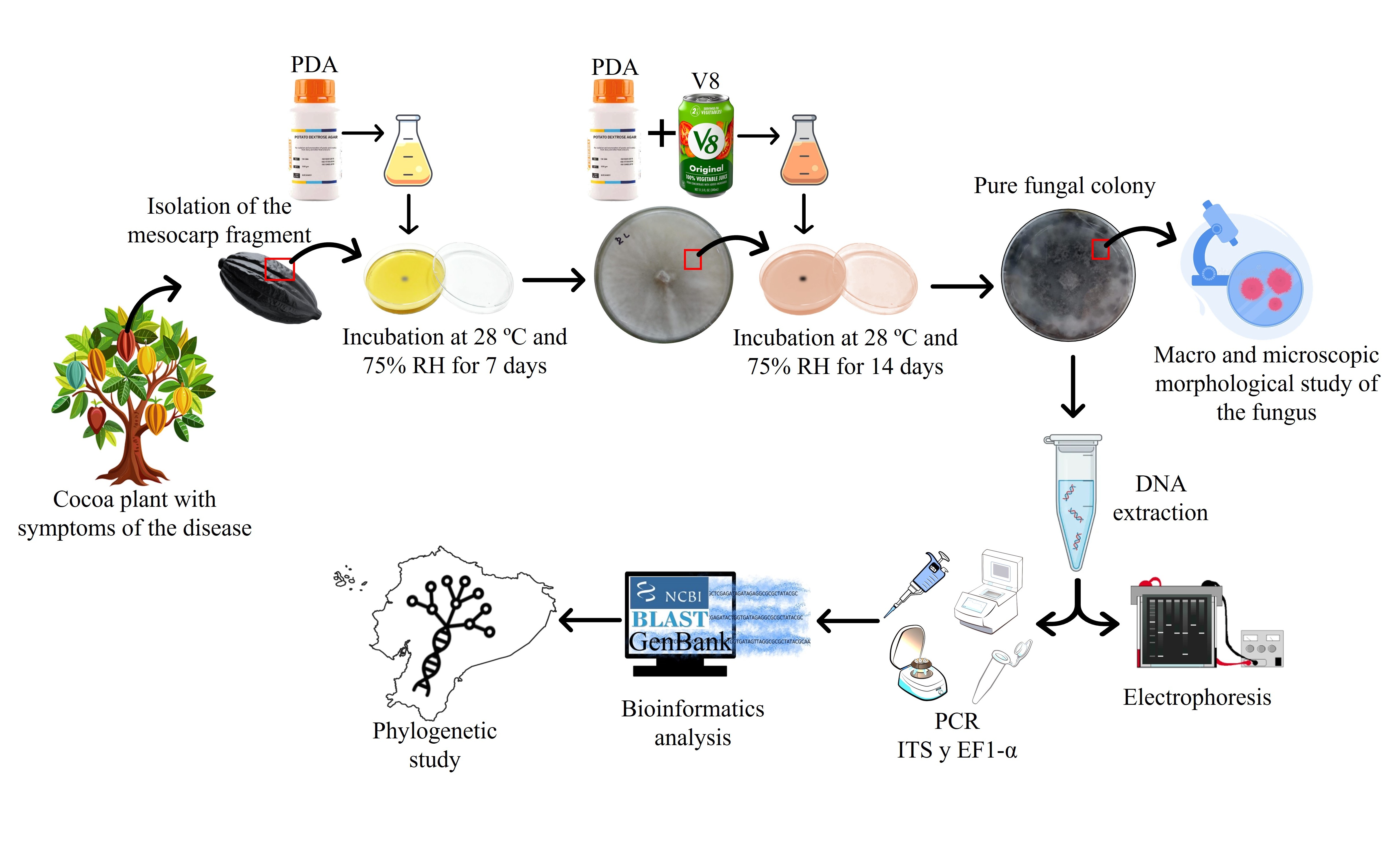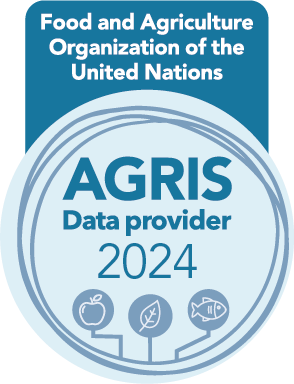Morphological characterization, molecular identification, and phylogenetic analysis of Lasiodiplodia theobromae associated with CCN-51 cacao plants in Ecuador
DOI:
https://doi.org/10.17268/sci.agropecu.2025.039Palabras clave:
Disease, species, ITS region, molecular identification, necrosis, rotResumen
Necrotrophic fungi are pathogens that cause tissue death in plants, which negatively impacts their growth and productivity. This study focused on identifying the presence of Lasiodiplodia theobromae in CCN-51 cacao plants in the Simón Bolívar canton in Ecuador. We sampled cacao pods exhibiting necrotic lesions and obtained fungal isolates for morphological and molecular characterization. Techniques, such as culturing on selective media, microscopy, and DNA sequencing were used to confirm the fungal identity. We compared our results with international databases and assessed the genetic variability of the isolates. Morphological characterization placed the fungal isolates within the family Botryosphaeriaceae, and molecular analysis using ITS and EF1-α regions confirmed the species as Lasiodiplodia theobromae, with 100% DNA quality for amplicon analysis and 100% sequence similarity in GenBank. We constructed phylogenetic trees using maximum likelihood methods, which revealed high genetic similarity and recent divergence among sequences despite their varied geographic origins. The fungal isolates specifically confirmed the presence of L. theobromae as the causal agent of necrotic lesions in CCN-51 cacao pods from Simón Bolívar. These findings underscore the importance of studying necrotrophic fungi in cacao plants to inform control strategies, improve crop resistance, and support sustainable production, essential to the global cacao trade.
Citas
Alvarez-Romero, P. I., Román-Robalino, D. A., Salazar-Castañeda, E. P., Suárez-Cedillo, S. E., Hinojosa-Sánchez, L. A., Ferreira, A. F. T. A. F. E., & Guallpa-Calva, M. A. (2025). Diversity and Composition of Endophytic Fungal Communities Associated with Cocoa (Theobroma cacao L.) Fruits in the Northern Ecuadorian Amazon. International Journal of Plant Biology, 16(1), 17. https://doi.org/10.3390/ijpb16010017
Cambero-Ayón, C. B., Rios-Velasco, C., Luna-Esquivel, G., López-Guzmán, G. G., Estrada-Virgen, M. O., & Cambero-Campos, O. J. (2024). Patógenos causantes de la pudrición de raíz en guanábana (Annona muricata L.), en Nayarit, México. Ecosistemas y Recursos Agropecuarios, 11(2), 1-9. https://doi.org/10.19136/era.a11n2.3672
Canchignia-Martinez, H. F., Cedeño-Moreira, A. V., Flores, F. J., & Garcés-Fiallos, F. R. (2025). Morphological, molecular and pathogenetic characterization of Lasiodiplodia laeliocattleyae associated with dieback and pod rot on cacao in Ecuador. Physiological and Molecular Plant Pathology, 136, 102572. https://doi.org/10.1016/j.pmpp.2025.102572
Clavijo, S. (2022). La agricultura venezolana y sus problemas sanitarios durante los años 2019 y 2020. Revista de la Facultad de Agronomía, 1(76), 3. http://saber.ucv.ve/ojs/index.php/rev_agro/article/view/25594
Ferreira de Souza, J. F. F., da Silva França, K. R., de Medeiros Ferro, M. M., de Oliveira Costa, J. F., Assunção, I. P., de Andrade Lima, G. S., & de Melo, M. P. (2025). Lasiodiplodia theobromae and Lasiodiplodia brasiliensis associated with dieback and canker in cupuaçu trees (Theobroma grandiflorum) in Brazil. Physiological and Molecular Plant Pathology, 139, 102759. https://doi.org/10.1016/j.pmpp.2025.102759
Flores Hernández, H., Flores Gracia, J., Varela Fuentes, S. E., Pérez Rodríguez, A., Azuara Domínguez, A., & Monteon-Ojeda, A. (2021). Reporte de Lasiodiplodia theobromae (Pat.) Griffon y Maubl. en árboles cítricos de Tamaulipas. Revista mexicana de ciencias agrícolas, 12(3), 499-511. https://doi.org/10.29312/remexca.v12i3.2640
Huda-Shakirah, A. R., Mohamed Nor, N. M. I., Zakaria, L., Leong, Y. H., & Mohd, M. H. (2022). Lasiodiplodia theobromae as a causal pathogen of leaf blight, stem canker, and pod rot of Theobroma cacao in Malaysia. Scientific Reports, 12(1), 1-14. https://doi.org/10.1038/s41598-022-13057-9
Huaman-Pilco, J., Huaman-Pilco, Á. F., Hernández-Diaz, E., Oliva-Cruz, S. M., & Díaz-Valderrama, J. R. (2024). Dieback and pod rot caused by Lasiodiplodia theobromae and L. iraniensis in native accessions of cacao (Theobroma cacao) from Amazonas, Peru. Indian Phytopathology, 77, 693-703. https://doi.org/10.1007/s42360-024-00771-9
Jaramillo-Aguilar, E. E., Peña-Zúñiga, E., Barriga-Medina, N., Rodríguez-González, D. A., Mattos-Calderón, L., León-Reyes, A., & Garcés-Fiallos, F. R. (2024). First Report of Lasiodiplodia theobromae Causing Fruit Crown Rot on Banana in Ecuador. Plant Disease, 108(11), 3410. https://doi.org/10.1094/PDIS-07-24-1370-PDN
Jiménez, W., Ramírez, A., López, J., & Alvarez, A. (2022). Análisis filogenético de aislamientos patogénicos de la familia Botryosphaeriaceae en cacao (Theobroma cacao L.) en la zona de Los Ríos. Revista Ciencia y Tecnología, 15(2), 45-54. https://doi.org/10.18779/cyt.v15i2.583
Ko, Y. Z., Shih, H. C., Shiao, M. S., & Chiang, Y. C. (2025). Cryptic host-associated differentiation and diversity: unravelling the evolutionary dynamics of the plant pathogen Lasiodiplodia. IMA fungus, 16, e147543. https://doi.org/10.3897/imafungus.16.147543
Lander, T. A., Atta-Boateng, A., Toledo-Hernández, M., Wood, A., Malhi, Y., Solé, M., & Wanger, T. C. (2025). Global chocolate supply is limited by low pollination and high temperatures. Communications Earth & Environment, 6(1), 97. https://doi.org/10.1038/s43247-025-02072-z
Mendoza-Churape, J., Vargas Sandoval, M., & Lara-Chávez, M. B. N. (2024). Botryosphaeriaceae en el cultivo de aguacate. Revista mexicana de ciencias agrícolas, 15(5), 1-10. https://doi.org/10.29312/remexca.v15i5.3745
Mondragón-Flores, A., Rodríguez-Alvarado, G., Gómez-Dorantes, N., Guerra-Santos, J. J., & Fernández-Pavía, S. P. (2021). Botryosphaeriaceae: una familia de hongos, compleja, diversa y cosmopolita. Revista mexicana de ciencias agrícolas, 12(4), 643-654. https://doi.org/10.29312/remexca.v12i4.2620
Moreira, M. A., Cedeño, M. Á., Canchingnia, M. F., & Garcés, F. F. (2021). Lasiodiplodia theobromae (Pat.) Griffon & Maubl [(syn.) Botryodiplodia theobromae Pat] in the cocoa crop: symptoms, biological cycle, and strategies management. Scientia Agropecuaría, 12(4), 653-662. https://dx.doi.org/10.17268/sci.agropecu.2021.068
Nurhikmah Mutmainna Sari, Abdul Munif, Widodo, & Agus Purwantara. (2025). Management of Cocoa Plant Pests & Diseases in East Luwu Regency. Jurnal Ilmu Pertanian Indonesia, 30(1), 177-186. https://doi.org/10.18343/jipi.30.1.177
Phillips, A. J. L., Alves, A., Abdollahzadeh, J., Slippers, B., Wingfield, M. J., Groenewald, J. Z., & Crous, P. W. (2013). The Botryosphaeriaceae: genera and species known from culture. Studies in mycology, 76(1), 51-167. https://doi.org/10.3114/sim0021
Pisco‐Ortiz, C., Rodríguez, E., Dávila‐Mora, L., Villabona‐Gelvez, A., & Zuluaga, P. (2024). First report of Lasiodiplodia theobromae causing dieback on Theobroma cacao in Colombia. New Disease Reports, 49(2), 1-4. http://dx.doi.org/10.1002/ndr2.12266
Plasencia-Vázquez, A. H., Vilchez-Ponce, C. R., Ferrer-Sánchez, Y., & Veloz-Portillo, C. E. (2022). Efecto del cambio climático sobre la distribución potencial del hongo Moniliophthora roreri y el cultivo de cacao (Theobroma cacao) en Ecuador continental. Terra Latinoamericana, 40, 1-14. https://doi.org/10.28940/terra.v40i0.1151
Quiroz, L. F. J., Carriel, C. A. B., Guerra, E. G., Proaño, T. E. L., Reyes, A. L., & Medina, N. N. B. (2024). Tolerancia in-vitro de Lasiodiplodia theobromae aislado de Musa paradisiaca y Rubus niveus a cinco fungicidas de diferente modo de acción. Ciencia y Tecnología, 17(2), 28-39. https://doi.org/10.18779/cyt.v17i2.83
Rehner, S. A., & Buckley, E. P. (2005). Cryptic diversification in Beauveria bassiana inferred from nuclear its and ef1-alpha phylogenies. Mycologia, 97(8), 84-98.
Sudha, A., Kavitha, P. S., Rajesh, M., Preetha, G., & Kavitha, S. (2025). Distribution and molecular characterization of Lasiodiplodia theobromae and Aceria guerreronis associated with coconut. Journal of Environmental Biology, 46(3), 389-399. http://doi.org/10.22438/jeb/46/3/MRN-5392
Sultana, R., Imam, Z., Kumar, R. R., Banu, V. S., Nahakpam, S., Bharti, R., & Siddiqui, M. W. (2025). Signaling and defence mechanism of jasmonic and salicylic acid response in pulse crops: role of WRKY transcription factors in stress response. Journal of Plant Growth Regulation, 44(1), 5-21. https://doi.org/10.1007/s00344-023-11203-9
Tiznado, M. D. L. A. M., Esquivel, G. L., Campos, O. J. C., Guerrero, L. G. R., & Velasco, C. R. (2018). Lasiodiplodia theobromae agente causal de la pudrición blanda de frutos de Artocarpus heterophyllus Lam. en Nayarit, México. Revista Brasileira de Fruticultura, 40, e-018. http://dx.doi.org/10.1590/0100-29452018018
Vélez‐Zambrano, S. M., Vélez‐Olmedo, J. B., García, S., Bonfim, B. S., Cedeño, P. E., & Pinho, D. (2023). Characterization of Lasiodiplodia theobromae (Pat.) Griffon & Maubl causing stem canker on Teak (Tectona grandis L.) in Ecuador. Forest Pathology, 53(5), 1-4. https://doi.org/10.1111/efp.12830
Vera Rodríguez, J. H., Jiménez Murillo, W. J., Naula Mejía, M. C., Cárdenas, U. J. V., Zaruma Quito, F. A., Montecé Maridueña, G. Y., & Astudillo Ludizaca, C. M. (2021). Residuos de la producción de cacao (Theobroma cacao L.) como alternativa alimenticia para rumiantes. Revista colombiana de ciencia animal recia, 13(2), 24-29. https://doi.org/10.24188/recia.v13.n2.2021.839
White, T. J., Bruns, T., Lee, S. J. W. T., & Taylor, J. (1990). Amplification and direct sequencing of fungal ribosomal RNA genes for phylogenetics. PCR protocols: a guide to methods and applications, 18(1), 315-322.
Yang, S., Yang, C., Wang, C., Yang, Y., Qiu, J., & Qin, L. (2025). Screening of endophytic fungi biocontrols against sapstain fungus (Lasiodiplodia theobromae) in rubberwood. European Journal of Wood and Wood Products, 83(3), 103. https://doi.org/10.1007/s00107-025-02257-5

Descargas
Publicado
Cómo citar
Número
Sección
Licencia
Derechos de autor 2025 Scientia Agropecuaria

Esta obra está bajo una licencia internacional Creative Commons Atribución-NoComercial 4.0.
Los autores que publican en esta revista aceptan los siguientes términos:
a. Los autores conservan los derechos de autor y conceden a la revista el derecho publicación, simultáneamente licenciada bajo una licencia de Creative Commons que permite a otros compartir el trabajo, pero citando la publicación inicial en esta revista.
b. Los autores pueden celebrar acuerdos contractuales adicionales separados para la distribución no exclusiva de la versión publicada de la obra de la revista (por ejemplo, publicarla en un repositorio institucional o publicarla en un libro), pero citando la publicación inicial en esta revista.
c. Se permite y anima a los autores a publicar su trabajo en línea (por ejemplo, en repositorios institucionales o en su sitio web) antes y durante el proceso de presentación, ya que puede conducir a intercambios productivos, así como una mayor citación del trabajo publicado (ver efecto del acceso abierto).




